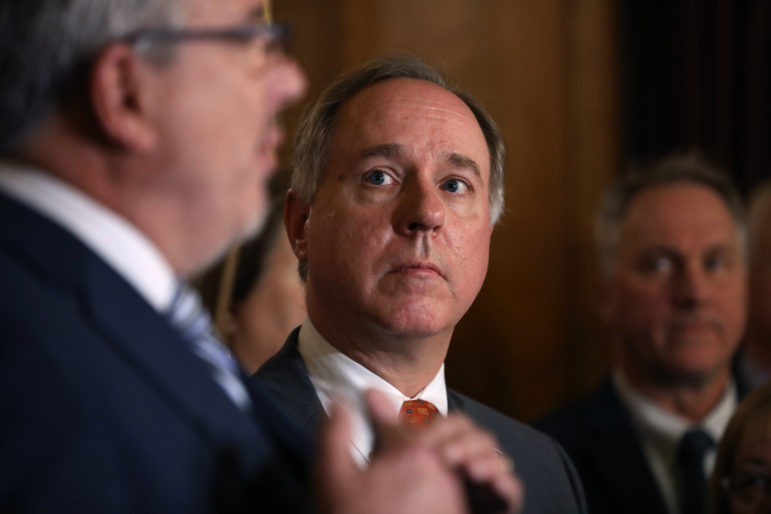Open Records Imperiled in Wisconsin
Led by Robin Vos, public officials more likely to obstruct open records requests.

Assembly Speaker Robin Vos. File photo by Coburn Dukehart / Wisconsin Center for Investigative Journalism.
In its observance of national Sunshine Week (March 13-19), the Wisconsin Freedom of Information Council has released its list of winners for this year’s Openness in Government Awards, or Opees. For the 16th consecutive year, we picked a journalist, a citizen, and a politician for special recognition.
The journalist was Isiah Holmes of the Wisconsin Examiner for his jaw-dropping records-based reporting on the Wauwatosa police department. The citizen was Christine Brenner, who wrestled away records from officials in the city of Fond du Lac.
The award we call the Scoopee, for Open Records Scoop of the Year, went to the Milwaukee Journal Sentinel for its series exposing how dangerous electrical wiring has for years been causing fires and claiming victims in Milwaukee. And we named Marinette Alderperson Douglas Oitzinger “Whistleblower of the Year” for suing his colleagues for improperly going into closed session.
But perhaps the most significant award was one for which I didn’t even bother to send the winners a notification, or invite them to the awards ceremony on April 21. It was the award we call the Nopee, for No Friend of Openness. It went to former state Supreme Court Justice Michael Gableman and state Assembly Speaker Robin Vos for their efforts to impede the release of documents regarding their investigation into the 2020 election, for which Vos has agreed to spend at least $676,000 of taxpayer money.
This is a recognition that Vos has received before. He won the Nopee in 2016 for his shocking attempt to exempt the Legislature from the state’s public records law, and for ending the longstanding requirement that significant donors to political campaigns reveal where they work.
Think of it: The Wauwatosa Police Department certainly used poor judgment in labeling the city’s mayor a “target” and putting journalist Holmes on a watch list of protesters. But when asked to produce records that revealed these lapses of judgment, it turned them over. The public records used by the Milwaukee Journal Sentinel to expose the problem of faulty wiring and inadequate enforcement were also provided upon request.
But Gableman and Vos blocked and even destroyed records to which the public was clearly entitled. Dane County Judge Frank Remington ruled on March 2 that the pair’s “denials, delays, and refusals . . . violate the letter and the spirit of Wisconsin’s public records law.” He ordered that they pay the legal fees of the group that took them to court over these refusals as well as $1,000 fines, costs that will likely be paid by the same taxpayers that the pair are seeking to keep in the dark. An appeal has been promised.
Remington noted that the response of Gableman’s office in denying access to these records “was to send a three sentence, misspelled, summary rejection email.” As Remington put it, “This is the sort of ‘unconsidered and irrational’ conduct deserving of punitive damages.”
Another Dane County judge, Valerie Bailey-Rihn, on March 10 ordered Vos to make an effort to retrieve the emails he had deleted to cover his tracks. “This is a governmental agency,” she said, expressing frustration over the lack of cooperation from Vos’ office. “I can’t believe there’s no policy, practice or procedures in place” with regard to records requests, “that it’s just up to whoever wants to do it, when they want to do it and . . . who knows if anybody did anything with it.”
And Mike Huebsch, a former member of the Public Service Commission, has sought to block the release of encrypted email messages he sent to an employee of American Transmission Co. (ATC), which is building a contested powerline requiring PSC approval. On February 28, in a hearing on a lawsuit alleging that Huebsch’s contacts with ATC created an unconstitutional “appearance of bias and lack of impartiality,” the Wisconsin Supreme Court’s conservative majority expressed support for the nondisclosure of records claimed to be “personal” communications.
Justice Brian Hagedorn called requiring these communications to be produced “a dramatic intrusion,” explaining that he’s in a fantasy football league with an attorney friend who has appeared before the court. “People have a lot of phone calls,” shrugged Justice Rebecca Bradley.
But even the cases of Prehn and Huebsch involve disputes that reasonable people might have over what records should be available. The failure of Gableman and Vos to even attempt to perform their obligations under the state’s open records law is a matter of much graver concern.
As hard as it may be at times to do so, most public officials in Wisconsin recognize their responsibilities under the law to produce records or at least an explanation for why a request is being denied. Gableman and Vos simply treat these requests with contempt.
But it isn’t. Wisconsin law grants state lawmakers the ability to destroy records at will, because they have exempted themselves from the records retention rules in place for all other state and local government officials.
Last March in the Wisconsin Examiner, during Sunshine Week, I was quoted as saying that this ability of legislators to evade accountability would lead “to inevitable abuse and eventual corruption.”
Justice Gableman and Assembly Speaker Vos have delivered it.
Bill Lueders is editor of The Progressive magazine. He also serves as the elected president of the Wisconsin Freedom of Information Council, a statewide group that works to protect public access to government meetings and records.
Op-Ed
-
Unlocking Milwaukee’s Potential Through Smart Zoning Reform
 Jul 5th, 2024 by Ariam Kesete
Jul 5th, 2024 by Ariam Kesete
-
We Energies’ Natural Gas Plans Are A Mistake
 Jun 28th, 2024 by John Imes
Jun 28th, 2024 by John Imes
-
Milwaukee Needs New Kind of School Board
 Jun 26th, 2024 by Jordan Morales
Jun 26th, 2024 by Jordan Morales





















